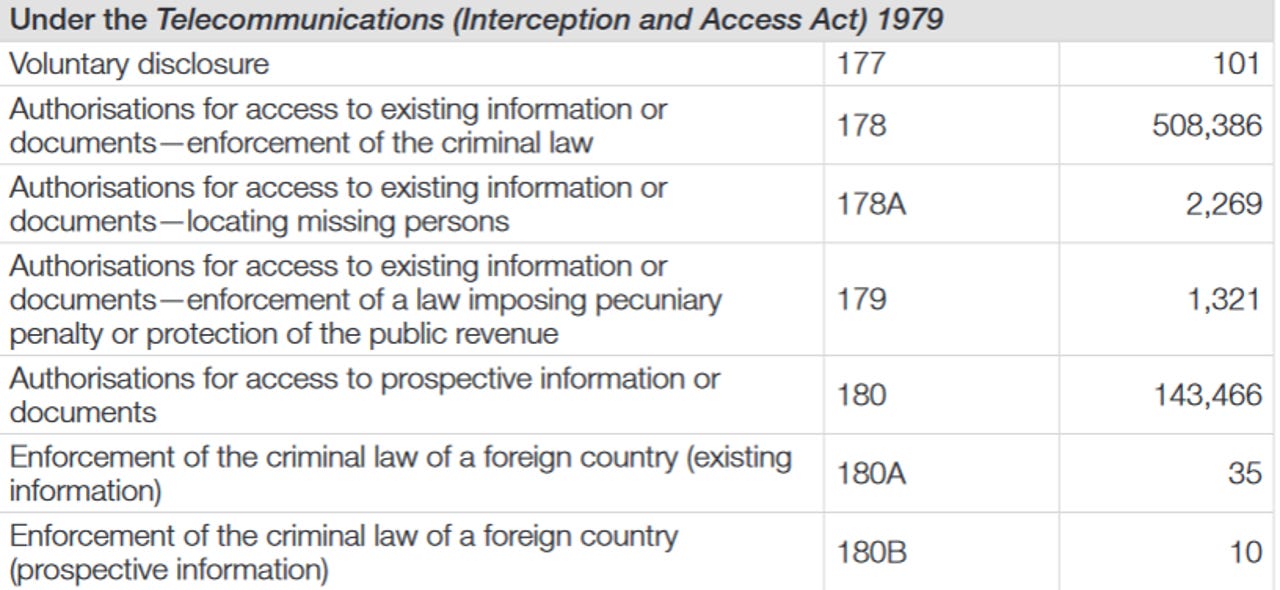More than half a million metadata disclosures handed to enforcement agencies: ACMA


Over 508,000 disclosures of metadata to law enforcement agencies for criminal law purposes under the controversial Telecommunications (Interception and Access) Act 1979 (TIA Act) occurred during the 2018-19 fiscal year, an increase from last year's 482,800, the Australian Communications and Media Authority (ACMA) 2018-19 annual report [PDF] has revealed.
The annual report, which was released this week, also showed under the TIA Act that nearly 143,500 authorisations were granted for access to prospective information or documents, while another 2,269 was for locating missing persons, and 1,300 disclosures were for enforcing a law imposing pecuniary penalty or protection of the public revenue.
In addition, there were 101 voluntary disclosures, 35 disclosures of existing information for criminal law enforcement in foreign countries, and 10 disclosures of prospective information for criminal law enforcement in foreign countries under the TIA Act.
These number contributed to the 2,776,000 total disclosures that were made under Part 13 of the Telecommunications Act by carriers during the reporting period, up from last year's 2,269,000 total disclosures.
Other disclosures that contributed to the total, according to the ACMA annual report, included the 245,000 disclosures used to assist the Telecommunications Industry Ombudsman, 744 to assist the ACMA itself, and 94 to assist the Australian Competition and Consumer Commission (ACCC).
Free PDF: Australia's encryption laws: An insider's guide
Like last year, the ACMA indicated that zero online services were blocked during 2018-19 under section 313(3) of the Telecommunications Act by agencies.
The ACMA also reported that during 2018-19 it was committed to adopting an agency-wide approach that prioritised providing "greater transparency, clarity, and certainty" in its compliance work. As part of that, it committed to making telecommunications consume safeguard one of its top priorities.
As a reflection of that, the ACMA issued just over 4,100 informal warnings and 165 formal warnings, which included 45 in relation to telco consumer safeguards.
Additionally, 15 infringement notices were issued, with telco consumer safeguards accounting for eight of those.
"This strategic approach provides transparency to industry on where the ACMA will be placing its compliance efforts in a consistent and coordinated manner," the ACMA chair Nerida O'Loughlin said.
When it came to the National Broadband Network (NBN) consumer experience safeguards, the ACMA carried out 50 investigations that resulted in 42 breaches, with 35 in relation to handling standards and another seven for information standards.
"Of the 50 investigations completed, 49 were finalised within the benchmark time frame of six months. The delay in one investigation was caused by the complexity of the matter, the high number of potential breaches to be assessed and the volume of evidence to review," the report stated.
The ACMA also revealed that it collected AU$691 million in revenue on behalf of the government in 2018-19.
Related Coverage
- Infinity Telecom hit by ACMA on customer information issues
- Telcos including Aussie Broadband hit by ACMA on customer information issues
- Australian government introduces new telco regulations to fight phone scams
- ACMA signs off on revised TCP Code
- Australia's TIO happy to take on digital platforms complaints